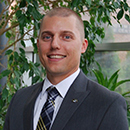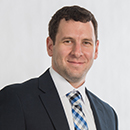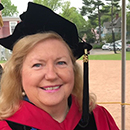Master of Science in Rehabilitation Science
The Master of Science in Rehabilitation Science (MS in RS) is a multidisciplinary program designed for health, wellness, and rehabilitation professionals interested in expanded roles in professional practice, administration, and research. This is a fully online program with a required ten-day on-campus summer residency. The residency provides hands-on training in accordance with a four-credit Techniques in Manual Therapy course focusing on clinical skill acquisition and application. The proposed degree is intended to provide professions in these positions opportunities to gain advance clinical techniques and skills together with the knowledge, skill, and ability to engage and produce discipline specific research (through the Rehabilitation Program Capstone).
Graduate and Professional Studies, in collaboration with the Athletic Training/Exercise Science Department, has established the following Goals and Outcomes for the Master's in Rehabilitation Science degree. The program is structured to support students to achieve these goals and outcomes by the time they complete the program.
Goal 1: Mastery of the Field of Rehabilitation Science
Upon completion of the major program of study in Rehabilitation Science, students will be able to
1. Identify, analyze and interpret disciplinary concepts
2.Acquire and implement advanced skills and abilities in rehabilitation techniques
3. Understand motor control, functional movement and the bases of dysfunctional movement
4. Recognize ethical issues pertaining to the Healthcare industry
5. Identify psychosocial interventions in health, wellness and fitness
6. Acquire and apply leadership skills in a healthcare environment
7. Develop and apply specialized manual therapy techniques
8. Engage and assess normal and abnormal human movement
9. Analyze, use, create and produce graduate level research
10. Synthesize and apply exercise prescription and therapeutic program design
11. Analyze and interpret normal and abnormal human movement
Goal 2: Clinical Reasoning
Upon completion of the major program of study in Rehabilitation Science, students will be able to
1. Incorporate evidence based practice into clinical decision making to improve patient/client outcomes
2. Develop of effective PICO questions for the purpose of engaging in evidence based practice
Goal 3: Develop, Implement and Consume Evidence-based Research
Upon completion of the major program of study in Rehabilitation Science, students will be able to
1. Synthesize accurate explanations of information presented in statistical forms. Make appropriate inferences based on that information.
2. Consume and interpret quantitative /qualitative analysis of data as the basis for deep and thoughtful judgments, draw insightful, carefully qualified conclusions from this work.
3. Explicitly describes assumptions and provides compelling rationale for why assumptions are appropriate. Show awareness that confidence in final conclusions is limited by the accuracy of the assumptions.
4. Apply quantitative information in connection with the argument or purpose of the work, present it in an effective format, and explicate it with consistently high quality.
Goal 4: Develop and Practice Effective Communication Skills
Upon completion of the major program of study in Rehabilitation Science, students will be able to
1. Engages in effective situational patient and client interaction
2. Develops effective communication strategies utilizing appropriate communication mediums
3. Identifies potential causes of communication breakdowns and conflict
4. Create, implement and analyze solutions applied to resolve conflict
Goal 5: Develop Effective Leadership Skills
Upon completion of the major program of study in Rehabilitation Science, students will be able to
1. Indentifies, develops and evaluate qualities of effective leadership
2. Develops and motivates people and teams to meet emerging trends and challenges
3. Demonstrates a critical understanding of financial, human and technical resources needed to manage and implement change.
| Course Code | Course Title | Credits |
|---|---|---|
| Core Courses | ||
| MSAT700 | Prof Behaviors & Evidence Based Practice | 3 |
| MSAT714 | Behavioral and Mental Health | 3 |
| RSCI701 | Advance Kinesiology and Biomechanics | 3 |
| RSCI702 | Pathokinesiology | 3 |
| RSCI703 | Musculoskeletal Functional Assessment | 3 |
| RSCI706 | Rehabilitation Program Design for Human | 3 |
| RSCI709 | Concepts & Application of Manual Therapy | 3 |
| RSCI716 | Ethical Issues in Healthcare Professions | 3 |
| RSCI780 | Quantitative & Qualitative Research | 3 |
| RSCI781 | Capstone | 3 |
6 credits of electives are required.
MSAT714 - Behavioral and Mental Health
Behavioral and Mental Health
RSCI701 - Advance Kinesiology and Biomechanics
The course involves a study of joint structure, joint function, and the biomechanical principles underlying the kinetics and kinematics of human motion, including normal gait and human movement. Emphasis is placed on the interaction between biomechanical and physiological factors in musculoskeletal and neuromuscular function, and the application of kinesiological principles to clinical rehabilitation practice.
RSCI702 - Pathokinesiology
The student will be introduced to a systematic evaluation approach based on the pathokinesiological model. The pathokinesiological model will examine human movement systems and it significance to regions of the human body. These regions will be recognized as potential sites for integrated pre-habilitation and rehabilitation exercise programs. Pre-requisite RSCI701
RSCI703 - Musculoskeletal Functional Assessment
The emphasis of this course is on the assessment of functional orthopedic conditions and musculoskeletal screening. The course emphasizes the application of systems analysis principles to clinical situations. The course goal is to improvethe clinician's ability to evaluate the patient's complaint as related to movement andidentify those patients who require additional orthopedic evaluation & referral whileassessing patient complaints in a logical deductive manner. Screening and assessment tools will be demonstrated as part of the process. In addition, the student is able to assess clinical scenarios as illustrated by relevant case studies.
RSCI704 - Concepts & Application of Manual Therapy
This hands-on course provides the theory and clinical application of current best practices in manual therapy techniques utilized in the treatment of orthopedic conditions that limit functional movement. The skills acquired in this course intend to produce any or all of the following effects: improve tissue extensibility; increase range of motion; mobilize soft tissues and joints; improve muscle function; modulate pain; and reduce soft tissue inflammation or restrictions in movement. A certification in a manual therapy technique will be acquired at the completion of the course. RSCI 704 is an on campus course scheduled during the required summer residency.
RSCI705 - Evidence Based Rehabilitation
The purpose of this course is to increase student understanding of various rehabilitation issues facing America and the world today. This course focuses students toward the ever-changing contemporary issues that impact direct and indirect client care.
RSCI706 - Rehabilitation Program Design for Human
This course will introduce pre-habilitation and rehabilitation exercise strategies based on limit function and dysfunction. The student will receive detailed insight into the design of corrective exercise programs. The systematic approach of an integrated corrective exercise design uniquely blends the variables of available flexibility, isolated and integrated strengthening, and exercise design to provide the student with the necessary foundation in designing and developing safe prevention and corrective exercise programs. Pre-requisite RSCI703.
RSCI708 - Applied Nutrition Across the Lifespan
This course provides an in-depth exploration of contemporary issues nutrition for active individuals across the life span. Course topics will include: nutrition timing, caloric expenditure, performance enhancement dietary supplements, dietary lipids and heart disease, dietary fiber and health, and influence of life +style factors on nutrition. Controversies in nutrition, ergogenic aids and cultural aspects of food are also discussed. In addition, the course covers energy and nutrient needs for physical and athletic activities. Common myths and fallacies concerning diet and athletic performance as well as appropriate dietary approaches for specific activities and active people will be addressed.
RSCI709 - Concepts & Application of Manual Therapy
Concepts & Application of Manual Therapy
RSCI712 - Field Experience
This course is designed for students interested in completing a field experience in their area of study. Students are expected to complete a minimum of 150 hours of supervised experience in an approved setting. For students in New England, the department will facilitate the placements at an approved affiliated site. For students outside of New England, the Associate Dean must approve the field experience site prior to enrolling in the course.
RSCI713 - Pharmacology
This course serves as a foundation to general pharmacology, focusing on categories of medications and their interaction with body systems. At the completion of this course, students will be able to integrate pathophysiological principles of pharmacology and patient assessment finds to formulate an impression and implement a pharmacologic management plan.
RSCI715 - Advanced Pathophysiology
This course involves an in-depth evaluation of disease and injury processes across the lifespan and their relevance to therapeutic rehabilitation are presented. Attention is given to all major physiological systems and their significance in the rehabilitation sciences.
RSCI716 - Ethical Issues in Healthcare Professions
This course is a study of the application of ethical principles, which includes the legal factors and professional behavior, which impact patient management and the rights of the consumer in the provision of medical and rehabilitation services. Ethical issues explored include: human value development, decision making, basic principles of health care, the nature of rights, confidentiality and management of health care information, professional gate keeping as a function of role fidelity, autonomy and paternalism, and justice and the allocation of scarce resources.
RSCI717 - Healthcare Leadership & Decision Making
This course is intended to prepare students for the leadership decisions and actions that are inherent in performance enhancement management and practice within healthcare and wellness settings. Principles and applications of leadership will be explored, including persuasiveness, leading and directing teams, leading within organizations, and leadership opportunities in shaping policy in healthcare and wellness settings. Techniques for managing change and empowering others are included in this course. Topics related to effective leadership are issues of power, motivation, delegation, team building, persuasion and negotiation, and total quality improvement are included in this course.
RSCI780 - Quantitative & Qualitative Research
This course provides an overview of foundations of research design and the uses and interpretation of results. Content includes: reviewing the literature, developing research problems/questions; hypothesis testing, experimental, quasi-experimental and other research designs; and evaluating research studies as they relate to evidence-based practice in the health professions. The intended outcome is to familiarize students with the evidence-based guidelines associated to clinical outcomes and evidence-based practice.
RSCI781 - Capstone
Through the completion of a research project, on a topic within the field, this course serves as an essential outcome component to augment the professional development and new learning that occurs in didactic course work and demonstrates the ability of the graduate to make significant contributions to their professions. Pre-requisite: must be taken in final semester of program.Prerequisite: RSCI780

Cristina Haverty
Associate Vice President of Workforce Development and Global Engagement
Office: Alexander STC
Email: chaverty@lasell.edu

Lori Rosenthal
Assistant Provost; Professor of Psychology
Office: Plummer
Email: lrosenthal@lasell.edu

Keith Belmore
Associate Professor of Athletic Training and Graduate Chair of Athletic Training
Office: Alexander STC 104N
Email: KBelmore@lasell.edu

Linda Bucci
Professor & Program Chair of Justice Studies, Graduate Chair of Criminal Justice
Office: Plummer
Email: lbucci@lasell.edu

Sarah Giasullo
Assistant Professor of Athletic Training; Graduate Chair of Health Sciences
Office: Alexander STC 104T
Email: SGiasullo@lasell.edu

Janet Huetteman
Graduate Chair of Management and Marketing; Associate Professor of Marketing
Office: 23 Maple Street, Office #5
Email: JHuetteman@lasell.edu

Young-Tae Kim
Associate Professor of Sport Management; Graduate Interim Chair of Sport Management
Office: Alexandar STC
Email: ykim@lasell.edu

Ron Laham
Assistant Professor of Athletic Training/ Exercise Science
Office: Alexander STC
Email: RLaham@lasell.edu

Meryl Perlson
Chair of Communication; Professor of Communication
Office: Donahue 107
Email: mperlson@lasell.edu

Matthew Reilly
Chair of Business and Interim Chair of Sport Management; Assistant Professor of Business
Office: DeArment
Email: MReilly@lasell.edu

Claudia Rinaldi
The Joan Weiler Arnow ’49 Professor/Professor of Education, Chair of Education
Office: Brennan Library
Email: CRinaldi@lasell.edu

Nancy Waldron
Assistant Provost; Professor of Entrepreneurship and Management
Office: DeArment
Email: nwaldron@lasell.edu

Brian Wardyga
Professor of Communication; General Manager, 109.2FM WLAS & LCTV
Office: Brennan Library, G04F
Email: bwardyga@lasell.edu
- Academic Policies 19-20
- Admission to Graduate Studies
- Course Descriptions
- Graduate Financial Information
-
Programs of Study
- Master of Science in Human Resources
- Master of Education
- Master of Science in Marketing
- Master of Science in Communication
- Master of Science in Criminal Justice
- Master of Science in Management
- Master of Science in Nutrition for Human Performance
- Master of Science in Athletic Training
- Master of Science in Project Management
- Master of Science in Rehabilitation Science
- Master of Science in Sport Management
-
Graduate Certificates
- Athletic Administration
- Emergency and Crisis Management
- Digital Media
- Negotiations and Conflict Resolution
- Public Speaking
- Health Communication
- Homeland Security and Global Justice
- Hospitality and Event Management
- Human Resources Management 19-20
- Integrated Marketing Communication
- Management
- Marketing
- Project Management
- Public Relations
- Sport Leadership
- Sport Tourism and Hospitality Management
- Violence Prevention and Advocacy
- Teaching English Learners with Disabilities Certificate
- International Inclusive Education Certificate
- MBA





